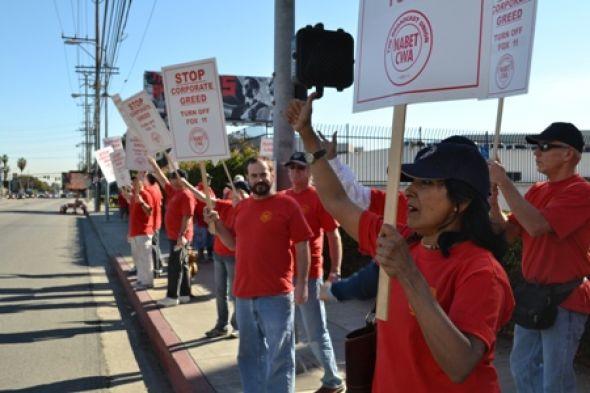

Since May of 2011, the producers, editors, photographers and other NABET-CWA* workers at KTTV and KCOP-TV in Los Angeles have been trying to negotiate a fair and reasonable contract with the owner of the stations, Fox Television – but the company has something else in mind.
Fox wants to end the standard 40-hour work week by putting NABET members on a seven-and-a-half-hour work day, and the management also wants to eliminate the paid meal period — which has been an industry standard for decades. Cutting back employees to a 37.5 hour work week effectively amounts to a 6.25 percent wage cut.
It doesn’t end there.
Fox also wants to cut vacation days, sick days, holidays and meal penalties. Premium pay for daily employees would be drastically reduced. Put it all together and many employees would see their wages and benefits reduced by 10 to 20 percent!
» Read more about: Fox: Gouge KTTV and KCOP Workers of Hours and Benefits »


Two potential candidates for president in 2016, New Jersey Governor Chris Christie and New York Governor Andrew Cuomo, have taken opposing positions on raising the minimum wage in their states. The debate between the two governors draws a sharp distinction between competing economic visions: trickle-down vs. middle-out economics. At the same time, it also shows how limited the current debate is when it comes to dealing with what’s needed to meet the needs of working families and, in doing so, change the direction of economic policy.
In late January, New Jersey Governor Chris Christie vetoed a small increase in the minimum wage, from the current federal minimum of $7.25 an hour to $8.50 an hour. Christie said that raising the minimum wage would “jeopardize New Jersey’s economic progress.” Christie based his opposition on concerns about small business, although two out of three low-wage workers are employed by corporations with over 100 employees.


One of the most exciting and inspirational aspects of coalition building is seeing the success and victories that people get when they come together for the common good of their community. The time and effort that can go into the work is nothing compared to the feeling of victory once the campaign has been won, and the people and community feel the victory themselves.
Unfortunately, groups that have never worked together are often times unwilling to do so because of longstanding suspicions or differences, so building coalitions around economic enhancement projects, political campaigns, religious events and community change is a very hard thing to do. However if you apply some strategy rules to the process you can build a great coalition.
First, you have to believe in what you are trying to build together – and also believe that it can be built. You can’t waste time fighting a cause that is not winnable.
» Read more about: The Art of Coalitions: Building Teams of Rivals, Not Enemies »


More than 30,000 Los Angeles County homes still face foreclosure threats or have already been seized by banks as their owners struggle to cope with more than $14 billion in mortgage debt, a new analysis by Good Jobs LA reveals. These homes include:
The recent news reports about an “easing” foreclosure crisis bring no comfort to the more than 30,000 L.A. County families facing underwater mortgages held by the same banking giants that did so much to crash our economy nearly five years ago.
And the same big banks that led us into crisis continue to top the foreclosure lists,
» Read more about: Foreclosing Time: L.A. County’s Mortgage Crisis Continues »


If you’re sitting in the well of the House when a president gives a State of the Union address (as I’ve had the privilege of doing five times), the hardest part is on the knees. You’re required to stand and applaud every applause line, which means, if you’re in the cabinet or an elected official of the president’s party, an extraordinary amount of standing and sitting.
But for a president himself, the State of the Union provides a unique opportunity to focus the entire nation’s attention on the central issue you want the nation to help you take action on.
President Obama has been focusing his (and therefore America’s) attention on immigration, guns, and the environment. All are important. But in my view none of these should be the central theme of his address Tuesday evening.
His focus should be on the joblessness, falling real wages, economic insecurity, and widening inequality that continue to dog the nation.


Postmaster General Patrick Donahoe’s plan to end Saturday mail delivery beginning August 5 is a “disastrous idea that would have a profoundly negative effect on the U.S. Postal Service (USPS) and on millions of customers,” says Letter Carriers (NALC) President Fredric Rolando.
Postal Workers (APWU) President Cliff Guffey says:
USPS executives cannot save the Postal Service by tearing it apart. These across-the-board cutbacks will weaken the nation’s mail system and put it on a path to privatization.
He adds that the USPS already has begun slashing mail service by closing 13,000 post offices or drastically reducing hours of operation, shutting hundreds of mail processing facilities and downgrading standards for mail delivery to America’s homes and businesses.
Rolando calls Donahoe’s strategy in dealing with the Postal Service’s financial challenges a “slash-and-shrink approach.”
Postal unions have tried to work with USPS management to develop costs savings and growth measures.


As I embark on a new chapter in my life as President and CEO of the Southern Christian Leadership Conference of Southern California, I’d like to reflect here upon some of the lessons I have learned while working at the Los Angeles Alliance for a New Economy for nearly 10 years. If we are going to help workers overcome the oppression they face on their jobs, and if we are going to work with communities to help them to become healthy and viable, then we have to have a dynamic plan and strategy that will lead to victory. Simply put in LAANE language, we must have a “strategy to win.”
For nearly 20 years LAANE has utilized this strategy to win to gain victories that have improved the lives of 350,000 people nationwide. It has engaged labor partners, environmental and community groups, and faith-based organizations, to score victories in and around Los Angeles.
» Read more about: The Calculus of Organizing: A Strategy To Win »


In February 2005, Patti Phillips sat by her daughter’s bedside during the weeks before Stephanie Phillips died of bone cancer. Patti was able to be at her daughter’s side the day she died because of the federal law that allows millions of Americans to take family leave without risking their jobs. “You want to be there with your child…. and you don’t want to worry about your job,” said Phillips, 49, an inventory specialist at Coca-Cola in Atlanta. “The law gives you peace of mind.”
This week will mark 20 years since the Family and Medical Leave Act (FMLA) was signed into law by the newly inaugurated President Bill Clinton on February 5, 1993, after years of bitter opposition by the Chamber of Commerce and other business lobbies. Clinton said that it was time for employers to make basic commitments to American workers so that during those critical times when we must put our family’s health first,
» Read more about: The Family and Medical Leave Act and Its Enemies »


For years, women who clean rooms at Hyatt hotels have been speaking out against the injuries and hazards they face at work. In a recent press statement, Hyatt denied there is a problem, reducing citations and settlements to mere technicalities. Despite their protests, California state regulators disagree.
In a bold move last week, state regulators fired back at statements made by a Hyatt spokesperson that problems housekeepers face at the Hyatt Fisherman’s Wharf Hotel were “the equivalent of lagging paperwork.”
According to Amy Martin, the chief counsel of Cal/OSHA who called the San Francisco Bay Guardian disputing claims made by a Hyatt spokesperson:
“Cal/OSHA believes it found plenty of evidence both of injuries sustained by housekeepers, as well as violations of Cal/OSHA regulations.”
Comments traded by Hyatt and government officials last week came after a major settlement in a longstanding case [revolving] around housekeeper injuries at the Hyatt Fisherman’s Wharf Hotel.
» Read more about: Frisco Hyatt: “WHAT Injury-Wracked Housekeepers?” »


Most of us have been on both sides of it — receiving a coffee or sandwich from an employee who seems just a little too happy to serve you, or being forced to beam a smile at a rude customer who views you as merely an annoying obstacle in his busy day. The term for this coerced sunniness is “emotional labor,” as first defined by sociologist Arlie Russell Hochschild in 1983.
Hochschild coined the term “emotional labor” in her 1983 book, The Managed Heart: Commercialization of Human Feeling, where she described it as ”management of feeling to create a publicly observable facial and bodily display … sold for a wage.”
Midwives, psychologists and funeral home directors are expected to calm the seas of their clients’ moods, and affluent visitors of high-end boutiques and restaurants pay a healthy premium to be coddled by their employees — but should workers making little more than minimum wage be forced to smile or be fired?


Exactly a century ago, on February 3, 1913, the 16th Amendment to the Constitution was ratified, authorizing a federal income tax. Congress turned it into a graduated tax, based on “capacity to pay.”
It was among the signal victories of the progressive movement — the first constitutional amendment in 40 years (the first 10 had been included in the Bill of Rights, the 11th and 12th in 1789 and 1804, and three others in consequence of the Civil War), reflecting a great political transformation in America.
The 1880s and 1890s had been the Gilded Age, the time of robber barons, when a small number controlled almost all the nation’s wealth as well as our democracy, when poverty had risen to record levels, and when it looked as though the country was destined to become a moneyed aristocracy.
But almost without warning, progressives reversed the tide. Teddy Roosevelt became president in 1901,
» Read more about: A Progressive Anniversary: The Income Tax Is 100 Years Old »


My (early) New Year’s resolution was to get a credit card. You may remember that I have never had a credit card. And thus if I were on the dating market, my OKCupid inquiries would be flatly rejected. It’s not that I have a bad score. I just don’t have one. I had a good score when I was dutifully paying off my student loan after I graduated, but then through paying dirt-cheap rent in Harlem and never paying for cable I was able to pay off the loan. Since then I haven’t owned any credit products. I’ve paid my rent on time every month and paid every bill before the due date. But those things don’t make their way over to FICO. I’ve thus landed myself in quite the Catch-22 that speaks volumes about the lending industry and our reliance on it.
When I moved into a new apartment three years ago,
» Read more about: Give Her Credit: A Writer’s Pursuit of Plastic Debt »


In 2012, Indiana and Michigan joined the ranks of the “right to work” states. They joined 22 other mostly Southern and Western states. All 11 Southern states are “right to work.”
Unfortunately, living in a “right to work” state doesn’t mean that you have a right to work. It doesn’t even mean that you have a right not to join a union. No one ever has to join a union.
It means that you don’t have to pay for union representation in collective bargaining even when the majority of the workers in their company have democratically voted to be represented by the union.
The union still bargains for you. It helps you get a good salary, paid holidays and a health plan. Members of the union sometimes even go out on strike to make sure you get these benefits.
But when it’s time to pay the piper,
» Read more about: Right to Work Laws: Opening Pandora’s Box »


The accolades for Timothy Geithner came on so thick and heavy in the last week that it’s necessary for those of us in the reality-based community to bring the discussion back to earth. The basic facts of the matter are very straightforward. Timothy Geithner and the bailout he helped engineer saved the Wall Street banks. He did not save the economy.
We can’t know exactly what would have happened if we did not have the TARP in October of 2008. We do know there was a major effort at the time to exaggerate the dangers to the financial system in order to pressure Congress to pass the TARP.
For example, Federal Reserve Board Chairman Ben Bernanke highlighted the claim that the commercial paper market was shutting down. Since most major companies finance their ongoing operations by issuing commercial paper, this raised the threat of a full-fledged economic collapse because even healthy companies would not be able to get the cash needed to pay their bills.


Atop the list of landmark laws that conservatives have never particularly warmed to are two that established fundamental rights for workers and consumers: the 1935 National Labor Relations Act, which provided employees a legal path to form unions, and the 2010 Dodd-Frank financial reform, which established a Consumer Financial Protection Bureau to rein in banks’ abusive treatment of depositors and mortgage holders. Conservatives have never had the votes or the gumption to repeal these statutes. But now they can essentially neuter these laws.
[Last] Friday, three judges on the U.S. Court of Appeals for the District of Columbia Circuit — all nominated by Republican presidents — ruled that President Obama lacked the authority for three appointments he had made to the National Labor Relations Board (NLRB) during the break between Congress’s 2011 and 2012 sessions. Invoking the president’s power to make one- or two-year appointments while Congress is in recess — a power that presidents have exercised as far back as James Madison — Obama appointed two Democrats and one Republican in the face of continued Republican opposition to his previous NLRB picks. » Read more about: Court Decision Could Cripple NLRB and Consumer Bureau »


As Senator Bernie Sanders has warned, “Social Security faces an unprecedented attack from Wall Street, the Republican Party and a few Democrats. If the American people are not prepared to fight back, the dismantling of Social Security could begin in the very near future.”
What exactly does the 99 Percent need to know to defend Social Security against the Wall Street One Percenters who want to profit by destroying it?
First, know our adversaries. Listen closely to the corporate-funded Heritage Foundation, headed by Tea Party hero and former Senator Jim DeMint. They want to turn part of our retirement and disability savings over to the same Wall Street firms that crashed our economy.
Heritage’s Social Security plan would
» Read more about: Wall Street’s Newest Hedge Fund: Social Security »


The Conference Board reported Tuesday that the preliminary January figure for consumer confidence in the United States fell to its lowest level in more than a year.
The last time consumers were this bummed out was October 2011, when there was widespread talk of a double-dip recession.
But this time business news is buoyant. The stock market is bullish. The housing market seems to have rebounded a bit.
So why are consumers so glum?
Because they’re deeply worried about their jobs and their incomes – as they have every right to be.
The job situation is still lousy. We’ll know more this coming Friday about what happened to jobs in January. But we know over 20 million people are still unemployed or underemployed.
Personal income is in terrible shape. The median wage continues to drop, adjusted for inflation.
Most people can’t get readily-available loans because banks are still cautious about lending to anyone without a sterling credit history.


The Republican Party spent the better part of the past few years reaching back a century or more for ideas. Where liberals saw the dangers of a creeping Gilded Age on the horizon, conservatives cheered the true freedom that attends gross economic inequality. Paul Ryan, one of the GOP’s standard-bearers, repeatedly excited crowds with the promise of the true adventure and excitement that comes from riding the free market without a social safety net. By adopting the Republican vision, he explained, you choose against “a dull, adventureless journey from one entitlement to the next, a government-planned life, a country where everything is free but us.”
Similarly, there is currently a conservative attempt to rehabilitate the infamous 1905 Supreme Court decision of Lochner v. New York, which struck down on economic liberty grounds a New York state law that forbade bakers from working more than 10 hours per day and 60 hours per week.
» Read more about: Atlas Smirked: Why the GOP Kicks the Ladders to Prosperity »


(Editor’s Note: The following includes excerpts from remarks made on KPFK’s Uprising program, which focused on the Los Angeles mayoral debate held January 28 .)
The argument that framed the debate – that Los Angeles could go bankrupt – is ridiculous. L.A. is one of the richest cities in the world. Yes, we face some budget challenges, but the solution is not to gut the modest retirement benefits of hard-working people. We need to focus on creating good jobs, which will increase our tax base, and making sure that we are generating the revenues we should from our incredible city-owned assets.
When the focus of the majority of the discussion is pensions, which is an issue but represents only 10 or 11 percent of the budget, and really is one of many important issues facing the city – when that is the primary subject of conversation most people are left wondering,
» Read more about: The Politics of Bankruptcy: The UCLA Mayoral Debate »


The state of California has ordered a Southern California warehouse that processes merchandise for Walmart and other retailers to pay 865 workers more than $1 million in stolen wages.
The California Division of Labor Standards Enforcement issued the citations Monday, Jan. 28 against Quetico, LLC, a large warehouse complex in Chino, California. Back wages and unpaid overtime total more than $1.1million and in addition the state issued about $200,000 in penalties.
“Quetico is strict when it comes to enforcing its rules with workers so it is only fair that the state enforce the laws that the company broke,” said Abraham Guzman, a warehouse worker who has been at Quetico for about two and a half years. “I am satisfied that the law will now be followed and workers have won justice.”
Last year workers brought concerns to the Warehouse Worker Resource Center, an advocacy organization that works with Warehouse Workers United.
» Read more about: State Hits Walmart Contractor With Wage-Theft Ruling »